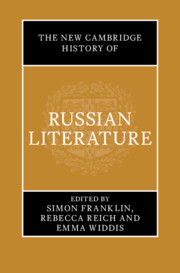Book contents
- The New Cambridge History of Russian Literature
- The New Cambridge History of Russian Literature
- Copyright page
- Contents
- Figures
- Contributors
- Acknowledgements
- On Transliteration, Names, and Dates
- Introduction
- History 1 Movements
- 1.1 The Age of Devotion
- 1.2 The Baroque Age
- 1.3 The Age of Classicism
- 1.4 Sentimentalism and Romanticism
- 1.5 The Natural School and Realism
- 1.6 Symbolism and the Fin de Siècle
- 1.7 Modernism and the Avant-Garde
- 1.8 Socialist Realism
- 1.9 Postmodernism
- 1.10 Contemporary Movements
- Boxes 1 Close Readings
- Boxes 2 Genres
- History 2 Mechanisms
- History 3 Forms
- History 4 Heroes
- Index
- References
1.10 - Contemporary Movements
from History 1 - Movements
Published online by Cambridge University Press: 31 December 2024
- The New Cambridge History of Russian Literature
- The New Cambridge History of Russian Literature
- Copyright page
- Contents
- Figures
- Contributors
- Acknowledgements
- On Transliteration, Names, and Dates
- Introduction
- History 1 Movements
- 1.1 The Age of Devotion
- 1.2 The Baroque Age
- 1.3 The Age of Classicism
- 1.4 Sentimentalism and Romanticism
- 1.5 The Natural School and Realism
- 1.6 Symbolism and the Fin de Siècle
- 1.7 Modernism and the Avant-Garde
- 1.8 Socialist Realism
- 1.9 Postmodernism
- 1.10 Contemporary Movements
- Boxes 1 Close Readings
- Boxes 2 Genres
- History 2 Mechanisms
- History 3 Forms
- History 4 Heroes
- Index
- References
Summary
While the first post-Soviet literary movements can be mapped in terms of their relationship to the marketplace, the decades that followed the 1990s marked the return of politics to Russian literature. The two dominant aesthetic styles in Russia since 2000 have been Postmodernism and New Sincerity. In this chapter it is argued that these two styles have proven more similar than was immediately apparent, and that, ultimately, they have followed the same trajectory: practitioners who may have initially appeared progressive or cast themselves as apolitical largely moved politically to the right. Among radical movements, the chapter highlights recent Russophone political poetry from socialist feminist and radical queer communities.
- Type
- Chapter
- Information
- The New Cambridge History of Russian Literature , pp. 184 - 197Publisher: Cambridge University PressPrint publication year: 2024

